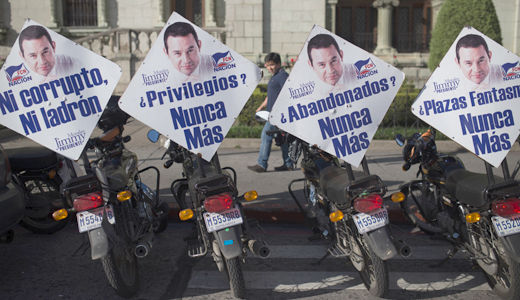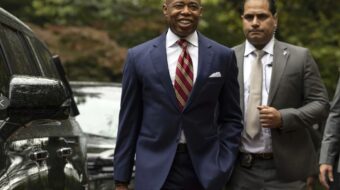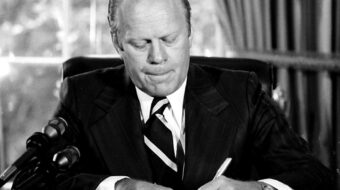
On Sunday October 25, slapstick comedian, actor and political outsider Jimmy Morales scored a landslide victory in the run off presidential election over former first lady Sandra Torres. But what this means politically is very much up in the air. One thing that is certain is that Guatemala’s political nightmares are not over.
Morales, from the National Convergence Front (Frente de Convergencia Nacional), racked up 68.52 percent, with a total of 2,699,977 votes, while Torres, of the UNE (National Unity for Hope) party won 31.48 percent with a total of 1,240,408 votes, on a turnout of about 54 percent.
It was thought that Torres, who had been popular when she was in charge of social programs for the poor in the administration of her husband, President Alvaro Colom, might do better in poor and indigenous areas to make up for Morales’ advantage in urban areas. Also, Morales’ crude comedy routines are often criticized for making fun of indigenous and African-Guatemalan people.
But evidently the corruption issue outweighed everything else for voters.
Morales had campaigned entirely on the theme of stamping out corruption (campaign slogan: “Neither corrupt, nor a thief”), for which he says, as president, he will have “zero tolerance.” Massive scandals have rocked the country since the springtime, leading to the resignation and arrest of the vice president, Roxana Baldetti, and then the President, Otto Perez Molina.
They are accused of heading up a scheme whereby customs officials would take bribes from importers in exchange for fraudulently lowered import taxes and fees, with the bribe money shared among officials including the president and vice president.
Guatemala’s Social Security Institute has also been found to be riddled with corruption. Among other things administrators of the Institute made a crooked contact with a company that was supposed to provide kidney dialysis to poor patients, but turned out not to be competent to do so, resulting in a number of deaths.
Crooked officials harvested at least $2.7 million in bribes in exchange for letting this contract. There have been many arrests for this scandal also.
For a while it looked as if another candidate, right wing populist Manuel Baldizon of the LIDER party, could win the presidential election but then more revelations in the corruption investigation, carried out by prosecutor Thelma Aldana and the U.N. sponsored Commission Against Impunity in Guatemala (C.I.C.I.G.), revealed a pattern of politicians accepting campaign money from criminals, including drug dealers, with Baldizon’s vice presidential candidate as a named suspect. So Baldizon was edged out by Torres for the runoff. But the investigations also revealed shady dealings involving Torres’ UNE party.
Morales promised to keep corruption-buster Thelma Aldana as attorney general and not dismantle the C.I.C.I.G. as Perez Molina had wanted to do. Apart from that, there is some mystery as to what his policies will actually be, other than being against corruption and abortion and in favor of the death penalty.
The party on whose ticket he ran, the National Convergence Front, is rooted in networks of retired army officers, some of whom appear to have been heavily involved in some of the worst atrocities of Guatemala’s civil war, including the massacres of Ixil Maya indigenous people in the 1980s.
A key role in the choice of Morales as the Convergence Front’s candidate and in his presidential campaign appears to have been played by Colonel Edgar Justino Ovalle Maldonado, who was also elected as a congressman in the first round of the elections on September 6.
According to declassified U.S. government documents, Ovalle held an important position in military operations in the Ixil Triangle area of Guatemala in 1981-198, under the successive military dictatorships of Generals Romeo Lucas Garcia and Efrain Rios-Montt. Ovalle is another product of the U.S. Army’s School of the Americas, now called the Western Hemisphere Institute for Security Cooperation, in Fort Benning Georgia, as was the now disgraced and jailed former president, Perez Molina, who also had been involved in army operations in the Ixil Triangle area in the 1980s.
The Guatemalan Civil War, which had its roots in the overthrow by the U.S. Central Intelligence Agency (C.I.A.) of the moderately left wing President Jacobo Arbenz in 1954, caused the death of at least 200,000 people, most of them unarmed civilians from the country’s large indigenous Maya population. Ninety three percent of the killings were carried out by the military or government aligned right wing death squads and supported by the United States, especially during the Reagan administration.
There were hundreds of massacres in which entire village communities were wiped out, and a large number of refugees fled over the border into Southern Mexico. The war ended in 1996, but Guatemala is still one of the most violent countries in the world and is mired in poverty exacerbated by racist oppression of the indigenous population.
These things, plus a drought and a coffee blight that are badly impacting Guatemala’s small farmers, have caused a sharp increase in the number of poor Guatemalans who migrate to the United States to find work.
During the period in which Ovalle was involved, there were scores of documented massacres in the Ixil Triangle alone. Former dictator Lucas Garcia died in 2006, but in 2013, a courageous prosecutor managed to put ex-President Rios Montt on trial for genocide and crimes against humanity. He was convicted and sentenced to 80 years in prison, but the conviction was quickly reversed on technical grounds, and it appears likely that the old dictator will never be punished. Ex-President Perez Molina, plus the acting President Alejandro Maldonado Aguirre all have claimed there was no genocide. Given Jimmy Morales’ closeness to retired military officers like Ovalle, it is not surprising that he repeats that claim, though he admits that human rights were violated.
Corruption in Guatemala also is rooted in the long period of impunity under military rule, so in voting for the anti-corruption candidate linked to figures from that period, Guatemalans may be in for a disappointment.
Motorcycles with signs in support of Jimmy Morales at a campaign rally in Guatemala City, Oct. 22. The signs read in Spanish “Privileges? Never again.” AP Photo/Luis Soto












Comments